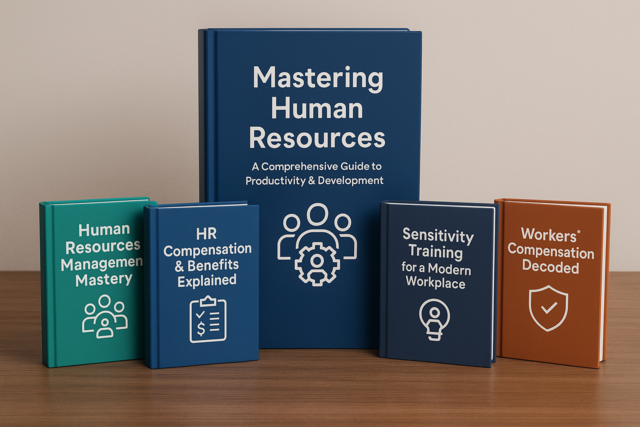Talent Management for Business
Unleash Potential, Drive Success.

5 Hours average completion time
0.5 CEUs
10 Lessons
18 Exams & Assignments
17 Discussions
12 Reference Files
81 Articles
Mobile Friendly
Last Updated January 2026
Talent Management: Transforming Human Capital into Business Success
In today's hyper-competitive global market, the true differentiator between companies that thrive and those that merely survive is often their most invaluable asset: human capital. Enter "Talent Management", a contemporary business philosophy tailor-made to harness, cultivate, and optimize this very asset, ensuring organizations are primed to flourish.
This comprehensive course transcends traditional notions of talent management. It delves deep into the strategic significance of managing talent, setting the stage for the success and growth of any enterprise, regardless of size or industry. Whether you're a budding entrepreneur establishing a start-up or helming a multinational conglomerate, this course is meticulously designed to ensure you master the essence and intricacies of talent management.
Course Highlights:
-
Understanding Talent Management: Trace the evolution of this transformative philosophy from its inception in a 1997 study by McKinsey and Company to its current status as an indispensable component of strategic business management. We demystify the jargon and provide clarity, allowing you to grasp and utilize this potent tool with dexterity.
-
Beyond HR: While Talent Management and HR often walk hand in hand, this course accentuates the broader spectrum of talent management. From succession planning, high potential management, holistic development strategies, to performance assessments, we delve into the crux of strategic, long-term talent initiatives.
-
The Holistic Approach: Learn why focusing solely on talent acquisition is just scratching the surface. We explore the roadmap for not only attracting premier talent but also nurturing, developing, and retaining them, ensuring they contribute to the organization's vision and mission effectively.
-
Performance Management & Beyond: Understand the multidimensional nature of talent management. While performance management forms its core, the course sheds light on myriad imperative functions that encapsulate this holistic philosophy.
-
Real-world Relevance: Benefit from concrete examples, contemporary language, and relevant scenarios. The curriculum is designed with a practical orientation, ensuring you can readily apply your learning in the real business world.
-
Current Perspectives: Especially in these turbulent economic times, recognize the pivotal role that sound talent management plays in securing business success, safeguarding companies from unforeseen challenges and ensuring sustained growth.
The realm of business is replete with buzzwords and fleeting trends. But amidst this sea of transient concepts, talent management has stood its ground, reinforcing its significance in modern business paradigms. This isn't just another management fad; it's a pivotal philosophy that's shaping the future of businesses worldwide.
Join us in this enlightening journey as we dissect, explore, and master the art of talent management. Together, we'll lay the foundation for turning human capital into a relentless force propelling your business to unparalleled heights. Transform your talent strategy, and watch your business success soar!
- Data-driven decision making
- Effective leadership alignment
- Holistic talent development
- Performance management optimization
- Continuous skill enhancement
- Systematic succession planning
- Organizational vision alignment
- Strategic workforce planning
- Adaptive recruitment strategies
-

Management Essentials
-

Sustainable Development for Business
-

Introduction to Ethics
-

Decision Making Skills
-

Managing Your Career
-

Team Building 101
-

Organizational Behavior in Business
-

Business Branding 101
-

Procurement Management
-

Generational Diversity in the Workplace
-

Respectful International Workplace
-

Problem Solving Strategies
-

Human Resources Productivity Course Bundle
-

Product Management 101
-

Mediation 101
-

Community Development 101
-

Personal Assistant 101
-

Ultimate Secretary Training Bundle
-

Motivational and Public Speaking
-

Creative Thinking Skills
-

Habits of Millionaires
-

Interpersonal Communication
-

Resolving Workplace Conflict
-

Workplace Sexual Harassment in the #MeToo Era
-

Kaizen 101 - An Introduction